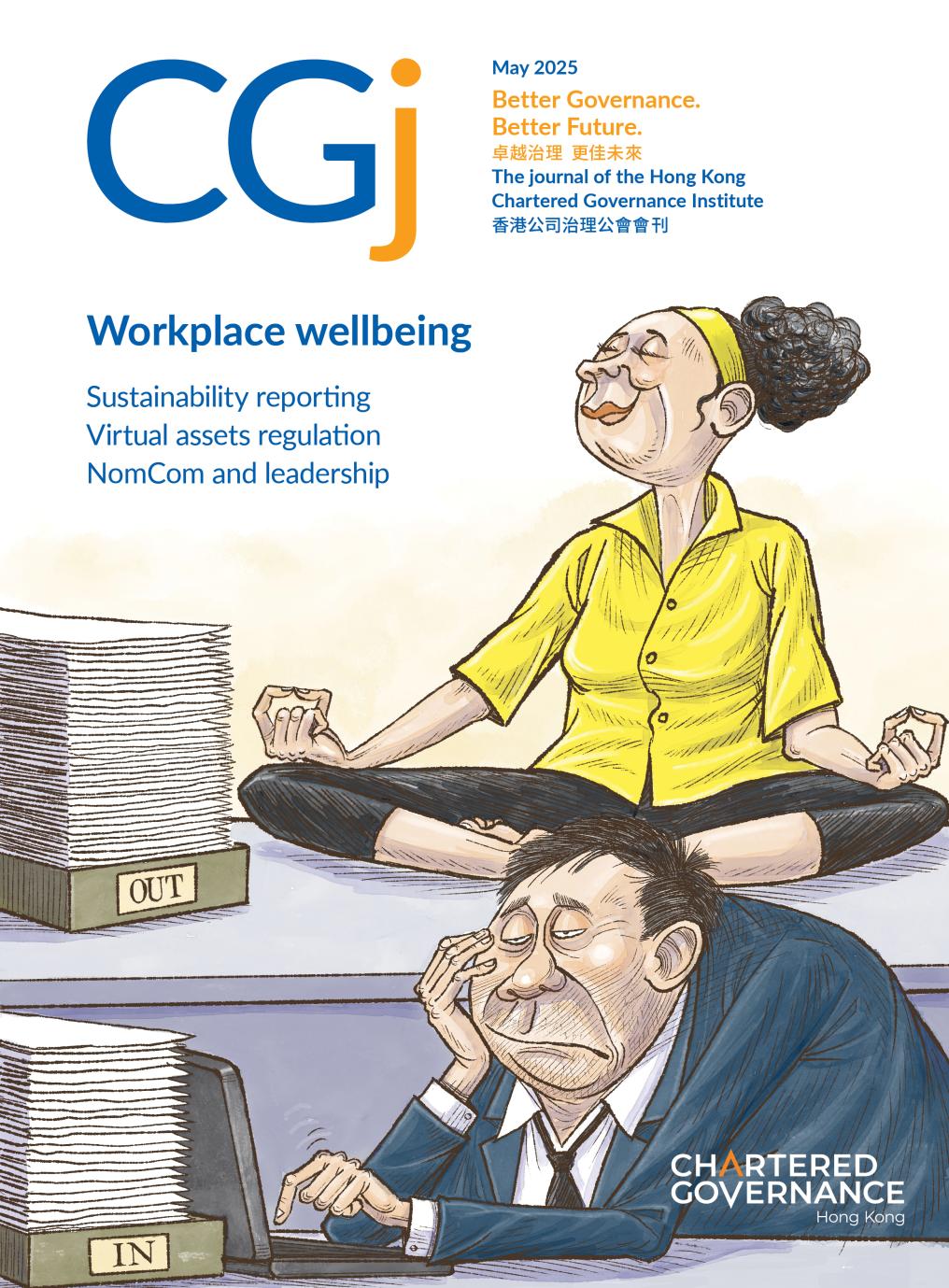This month’s interview is with Dr PM Kam FCG HKFCG, Convenor of the Institute’s Investment Strategy Task Force.
When did you first join the Institute and what was your professional role at that time?
‘I was elected as an Associate in April 1974 and became a Fellow in April 1980. At that time, the Institute was an association of Hong Kong members of The Institute of Chartered Secretaries and Administrators of London (now The Chartered Governance Institute). I was then an executive of the Group Finance Department of Jardine Matheson, which I joined in 1976.
I became a member of The Hong Kong Institute of Company Secretaries in August 1994, when the Institute obtained local status through the Companies Ordinance. My first active role with the Institute was serving as its representative on the Hong Kong Management Association’s Best Annual Report Awards Judging Panel from 2014 to 2016, after which I continued assisting my successor in the financial statement review until 2018. Additionally, I was a member of the advisory board for the Institute’s AML/CFT Charter and I joined the Investment Strategy Task Force in 2015, later becoming its Convenor in 2017 – a role I still hold.’
Did membership of the Institute support your career development and, if so, in what ways?
‘I completed the Institute’s examinations in less than three years and became a licentiate in 1972. That accomplishment boosted my confidence in completing other professional accounting examinations. Membership of the Institute certainly provided a strong foundation for my future managerial roles. I also enjoyed being a mentor for the Institute’s mentorship programme.’
How has governance in the accounting field evolved over the decades?
‘The accountancy profession in Hong Kong took a major step forward in 1973 with the establishment of the Hong Kong Society of Accountants – now the Hong Kong Institute of Certified Public Accountants (HKICPA) – as a self-regulatory body. Following the Asian financial crisis in the late 1990s and corporate scandals in the US in the early 2000s, regulatory enhancements were introduced. The Financial Reporting Council (FRC) – of which I was Chief Executive from 2010 to 2013 – was established in 2006 and became fully operational in 2007. Further reforms in 2019 aligned Hong Kong’s auditor regulatory regime with major international capital markets. In 2022, the FRC was renamed the Accounting and Financial Reporting Council, expanding its regulatory scope to cover all auditors and accounting professionals in Hong Kong.
Hong Kong’s financial reporting and auditing standards fully converged with international accounting and auditing standards in 2005. Jardine Matheson was an early adopter of the International Financial Reporting Standards (IFRS) and I helped prepare the company’s consolidated financial statements in accordance with IFRS as early as 1990.’
What would you say have been the most significant changes in corporate governance in Hong Kong?
‘I believe there have been several key developments. The first corporate governance initiative in Hong Kong emerged in 1992 with regulations addressing conflicts of interest. In 1993, the Stock Exchange introduced a requirement for listed companies to have at least two independent nonexecutive directors. Another major milestone came in 1999, with the recommendation for companies to establish audit committees, followed in 2004 with a revision to the Listing Rules mandating that these committees comprise only non-executive directors. These committees play a vital role in governance by overseeing financial reporting integrity, internal financial controls, risk management and internal audit effectiveness. In 2005, the Code on Corporate Governance Practices and Corporate Governance Report requirements were incorporated into the Listing Rules. ESG reporting requirements were introduced in 2016, with the most recent development being the issuance of HKFRS S1 and S2 by the HKICPA, aligning Hong Kong’s sustainability disclosure requirements with international standards.’
Do you still play a role in governance, and if so, what areas do you focus on?
‘I continue to contribute to governance as an independent non-executive director of a listed company in Hong Kong. My primary concern is the implementation of the Sustainability Disclosure Standards, particularly the disclosure of the effects of sustainability risks and opportunities on an organisation’s financial position, performance and cash flow.’
What qualities are needed to be an effective leader in governance?
‘Integrity is the most critical quality – an effective leader must be honest and must uphold strong moral principles. Empathy is also essential, as leaders should understand the needs of those they govern. Change management skills are crucial, given that people often resist change, and a good leader must guide them through it. Collaboration and teamwork are vital. No leader can operate alone and the ability to foster cooperation across diverse stakeholders is essential.’
What advice would you give to the younger generation starting out in their governance careers?
‘First, gain expertise in security risk assessment and security audit, which involve identifying and evaluating IT security risks and determining the level of compliance with the security policy or standards. Second, understand data protection and the provisions of the Personal Data (Privacy) Ordinance. Third, develop professional scepticism, maintaining a questioning mindset and vigilance in terms of potential errors or fraud. Lastly, embrace technology in the workplace and adopt an open-minded and proactive approach to learning new things.’
no leader can operate alone and the ability to foster cooperation across diverse stakeholders is essential
Dr PM Kam FCG HKFCG
Convenor of the Institute’s Investment Strategy Task Force
本月的访谈嘉宾是甘博文博士FCG HKFCG,他是公会投资策略工作小组召集人。
您是什么时候加入公会的?当时您的专业身份是什么?
‘我于1974年4月获选为会士,并于1980年4月成为资深会士。当时,公会还是伦敦特许秘书及行政人员公会(现为特许公司治理公会)的香港会员组织。我于1976年加入怡和集团,在集团财务部担任行政职务。
1994年8月,当香港公司秘书公会通过《公司条例》获得本地地位时,我成为了公会的一员。我在公会的第一个活跃角色,是在2014年至2016年代表公会担任香港管理专业协会最佳年报奖评审小组成员,之后继续协助继任者进行财务报表审阅工作,直至 2018年。此外,我还是公会反洗钱与反恐怖融资活动约章谘询委员会的成员,并于2015年加入投资策略工作小组,后来于2017年成为其召集人。我现在仍担任此职务。’
公会的会员资格是否有助于您的职业发展?如果有,在哪些方面?
‘我在不到三年的时间内完成了公会的考试,并于1972年获取资格。这一成就增强了我完成其他专业会计考试的信心。成为公会会员,为我未来担任管理工作奠定了坚实的基础。我也很享受担任公会导师计划的导师。’
多年来,治理在会计领域有何变化?
‘香港会计行业在1973年迎来了重要变革,香港会计师公会成立,成为自我监管机构。1990年代末亚洲金融危机及2000年代初美国企业丑闻后,监管逐步加强。2006年, 财务汇报局成立,并于2007年全面运作。我曾于2010至2013年担任财务汇报局行政总裁。2019年的进一步改革,使香港的审计监管制度与主要国际资本市场接轨。 2022年,财务汇报局更名为会计及财务汇报局,监管范围 扩展至所有香港的审计师及会计专业人士。
2005年,香港的财务汇报及审计准则全面与国际会计及审计准则接轨。怡和集团是较早采用国际财务报告准则(IFRS)的公司之一,早在1990年,我便已协助公司根据IFRS编制综合财务报表。’
您认为香港公司治理领域发生了哪些重大变化?
‘我认为有几个关键发展。香港的第一项公司治理举措始于1992年,当时制定了有关利益冲突的法规。1993年,联交所要求上市公司必须至少有两名独立非执行董事。另一个重要里程碑是在1999年,监管机构建议企业设立审核委员会,随后在2004年修订《上市规则》,规定这些委员会只能由非执行董事组成。这些委员会在公司治理中发挥关键作用,负责监督财务报告的完整性、内部财务控 制、风险管理及内部审计的有效性。
2005 年,《上市规则》纳入《企业管治常规守则》和《企业管治报告》的要求。2016年,香港引入了环境、社会和管治报告要求,最新的进展是香港会计师公会发布了《香港财务报告准则S1》和《香港财务报告准则S2》, 使香港的可持续发展披露要求与国际标准保持一致。’
您仍然参与公司治理的工作吗?如果是,你关注哪些领域?
‘我仍然担任香港一家上市公司的独立非执行董事,为治理尽一分力。我最关注的是可持续发展披露准则的实施, 尤其是如何披露可持续发展风险及机遇对企业财务状况、 经营表现及现金流的影响。’
一名高效的领导者需要具备哪些素质?
‘诚信是最重要的素质,一名有效的领导者必须诚实,并坚守道德原则。同理心同样不可或缺,领导者应理解所治理群体的需求。变革管理能力也至关重要,因为人们往往抗拒变革,优秀的领导者需引导他们适应改变。协作和团队精神也是关键要素。没有领导者能单打独斗,促进不同持份者之间合作的能力非常重要。’
您对刚刚开始治理生涯的年轻一代有什么建议?
‘首先,掌握安全风险评估及安全审计的知识,这涉及识别及评估资讯科技安全风险,并确定企业是否符合资安政策或标准。其次,熟悉数据保护法规,以及《个人资料(私隐)条例》的条文。第三,培养专业的怀疑精神,保持质疑态度,并對潜在的错误或欺诈保持警惕。最后,积极支持在工作中应用科技,保持开放的心态,主动学习新事物。’
没有领导者能单打独斗, 促进不同持份者之间合作的能力非常重要。
甘博文博士FCG HKFCG
公会投资策略工作小组召集人



